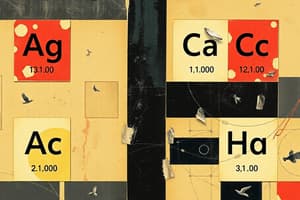Podcast
Questions and Answers
Which type of bond involves the transfer of electrons from one atom to another, forming a cation and an anion?
Which type of bond involves the transfer of electrons from one atom to another, forming a cation and an anion?
- Ionic bond (correct)
- Covalent bond
- Hydrogen bond
- Metallic bond
What does a chemical formula indicate?
What does a chemical formula indicate?
- How the atoms are bonded together
- The elements present and the number of atoms of each (correct)
- The actual number of atoms present in the molecule
- The relative number of atoms
How are valence electrons represented in the Lewis model?
How are valence electrons represented in the Lewis model?
- As shared electrons
- As positive charges
- As dots surrounding the symbol for an element (correct)
- As noble gas electron configurations
Which type of bond is formed when two atoms share a single electron pair?
Which type of bond is formed when two atoms share a single electron pair?
What is the formula mass of a compound?
What is the formula mass of a compound?
What are organic compounds primarily composed of?
What are organic compounds primarily composed of?
Which type of bond involves two shared pairs of valence electrons?
Which type of bond involves two shared pairs of valence electrons?
What is the relationship between the formula mass and the molar mass of a compound?
What is the relationship between the formula mass and the molar mass of a compound?
How can we determine the mass percent composition of a compound?
How can we determine the mass percent composition of a compound?
Which type of bond involves the transfer of electrons from one atom to another, forming a cation and an anion?
Which type of bond involves the transfer of electrons from one atom to another, forming a cation and an anion?
In the Lewis model, how are valence electrons represented?
In the Lewis model, how are valence electrons represented?
What is the difference between an empirical formula and a molecular formula?
What is the difference between an empirical formula and a molecular formula?
Flashcards are hidden until you start studying




